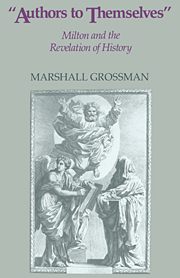6 - “The Hour of Noon Drew On”
Published online by Cambridge University Press: 23 October 2009
Summary
THE FIRST LINES OF PARADISE LOST IX warn that we have reached the tragic climax promised in the poem's opening proclamation of a tragic and restorative movement. The “tragic notes” of the fall are projected in various ways. As we have seen, Books IV and VIII disclose the characteristic subjectivity of Adam and Eve. In Book IX the narrator's explicit comments and the events he recounts are complemented by the rhetorically controlled alteration of that subjectivity through the polarization of Adam and Eve's pre- and postlapsarian perceptions of Eden. The prelapsarian perception is one of fecund harmony, as expressed by Eve:
Adam, well may we labor still to dress
This Garden, still to tend Plant, Herb and Flow'r,
Our pleasant task enjoin'd, but till more hands
Aid us, the work under our labor grows,
Luxurious by restraint; what we by day
Lop overgrown, or prune, or prop, or bind,
One night or two with wanton growth derides
Tending to wild.
(IX.205–12)After the fall, Eden becomes what Adam calls “these wild Woods forlorn” (IX.910), a place in which to hide from the gaze of heaven:
O might I here
In solitude live savage, in some glade
Obscur'd, where highest Woods impenetrable
To Star or Sun-light, spread thir umbrage broad,
And brown as Evening: Cover me ye Pines,
Ye Cedars, with innumerable boughs
Hide me, where I may never see them more.
(IX. 1084–90)The narrative of Book IX must mediate these opposed perceptions of the world to articulate the continuity and change that ensure the unity and the disjuncture of Adam and Eve before and after their fall.
- Type
- Chapter
- Information
- Authors to ThemselvesMilton and the Revelation of History, pp. 126 - 150Publisher: Cambridge University PressPrint publication year: 1988



